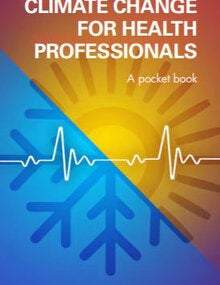The effects of climate change on human health are unequivocal and can already be perceived worldwide. Phenomena such as heat waves, cold waves, floods, droughts, hurricanes, storms, and other extreme weather events can impact health both directly and indirectly, as well as trigger or exacerbate certain conditions and, consequently, put pressure on health services and their infrastructure. These include vector-borne, waterborne, and foodborne diseases—due to changes in the behavior and distribution of vectors and pathogens—and mental health disorders induced by mounting social unrest and forced displacement.
Climate change for health professionals is a pocket book based on empirical data that offers essential information for medical personnel and other health professionals to realize the impacts of climate change on their daily practice. With this quick reference guide, providers can easily recognize diseases and side effects related to climate change, implement appropriate management and provide guidance to exposed populations, provide up-to-date information on the relationship between the adverse effects of certain drugs and the worsening of climate-sensitive health conditions, and determine the possible consequences of climate change for health services.
This book addresses key meteorological risks, as well as the health conditions which they may influence, grouped by specific clinical areas. With this publication, the Pan American Health Organization aims to help build knowledge on the subject and strengthen the capacity of health systems to predict, prevent, and prepare, with a view to offering continuous high-quality health services in a world where climate is changing rapidly.
|

